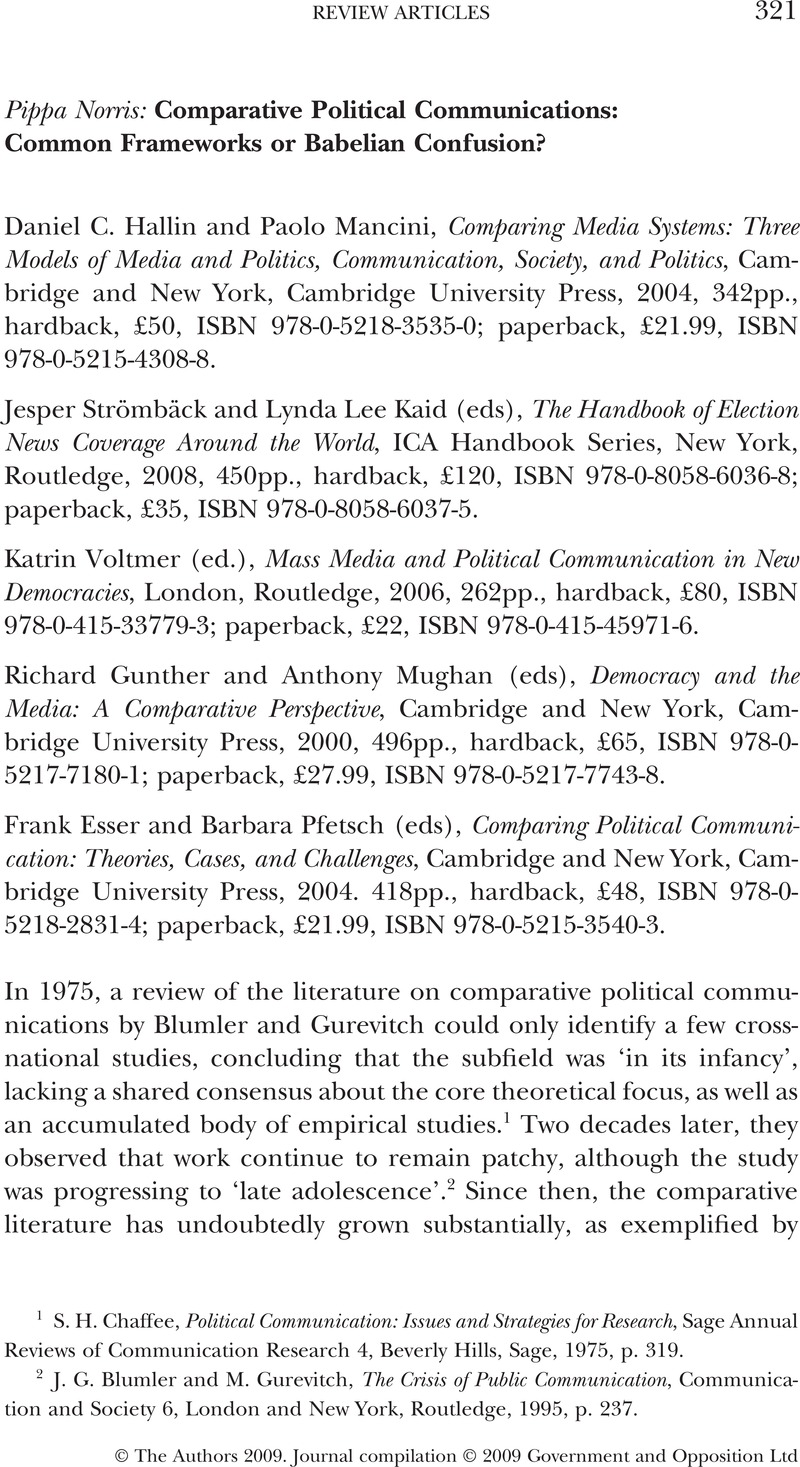Article contents
Comparative Political Communications: Common Frameworks or Babelian Confusion?
Published online by Cambridge University Press: 02 January 2013
Abstract

- Type
- Review Articles
- Information
- Copyright
- Copyright © The Author(s) 2009.
References
1 Chaffee, S. H., Political Communication: Issues and Strategies for Research, Sage Annual Reviews of Communication Research 4, Beverly Hills, Sage, 1975, p. 319.Google Scholar
2 Blumler, J. G. and Gurevitch, M., The Crisis of Public Communication Communication and Society 6, London and New York, Routledge, 1995, p. 237.CrossRefGoogle Scholar
3 See, for example, Kelly, M., Mazzoleni, G. and McQuail, D., The Media in Europe: The Euromedia Research Group, 3rd edn, London and Thousand Oaks, CA, Sage, 2004, p. 274.Google Scholar
4 Hallin, D. C. and Mancini, P., Comparing Media Systems: Three Models of Media and Politics, Communication, Society, and Politics 15, Cambridge and New York, Cambridge University Press, 2004, p. 342.CrossRefGoogle Scholar
5 Strömbäck, J. and Kaid, L. L., The Handbook of Election News Coverage Around the World, ICA Handbook Series 19, New York, Routledge, 2008, p. 450.Google Scholar
6 Boix, C. and Stokes, S. C., The Oxford Handbook of Comparative Politics, Oxford Handbooks of Political Science 11, Oxford and New York, Oxford University Press, 2007, p. 1021.Google Scholar
8 Norris, P., ‘The Globalization of Comparative Public Opinion Research’, in Robinson, N. and Landman, T. (eds), The Sage Handbook of Comparative Politics, London, Sage, 2009.Google Scholar
9 George, Alexander L. and Bennett, Andrew, Case Studies and Theory Development, Cambridge, MA, MIT Press, 2004.Google Scholar
10 Ragin, C. C., Fuzzy-Set Social Science, Chicago, University of Chicago Press, 2000, p. 352.Google Scholar
11 Chakravartty, P. and Zhao, Y., Global Communications: Toward a Transcultural Political Economy, Critical Media Studies 11, Lanham, MD, Rowman & Littlefield, 2008, p. 359.Google Scholar
12 Rantanen, T., The Media and Globalization, London and Thousand Oaks, CA, Sage, 2008, p. 180.Google Scholar
13 Geddes, B., Paradigms and Sand Castles: Theory Building and Research Design in Comparative Politics, Analytical Perspectives on Politics 10, Ann Arbor, University of Michigan Press, 2003, p. 314 Google Scholar; Dogan, M. and Pélassy, D., How to Compare Nations: Strategies in Comparative Politics, Chatham, NJ, Chatham House, 1984, p. 185.Google Scholar
14 Mill, J. S., Principles of Political Economy: With Some of their Applications to Social Philosophy, 2 vols, London, J.W. Parker, 1848.Google Scholar
15 Esser, F. and Pfetsch, B., Comparing Political Communication: Theories, Cases, and Challenges, Communication, Society, and Politics 16, Cambridge and New York, Cambridge University Press, 2007, p. 418.Google Scholar
16 Sartori, G., Parties and Party Systems: A Framework for Analysis, Cambridge and New York, Cambridge University Press, 1976.Google Scholar
17 Duverger, M., Les partis politiques, Sciences politiques, Paris, Colin, 1951, p. 476.Google Scholar
18 Rae, D. W., The Political Consequences of Electoral Laws, rev. edn, New Haven, CT, Yale University Press, 1971, p. 203.Google Scholar
19 Lijphart, A., Democracies; Patterns of Majoritarian and Consensus Government in Twenty-One Countries, New Haven, CT, Yale University Press, 1984, p. 229.Google Scholar
20 Siebert, F. S., Peterson, T. [and] Schramm, W., Four Theories of the Press: The Authoritarian, Libertarian, Social Responsibility, and Soviet Communist Concepts of what the Press Should Be and Do, Urbana, University of Illinois Press, 1956, p. 153.Google Scholar
21 De Smaele, H., ‘The Applicability of Western Media Models on the Russian Media System’, European Journal of Communication, 14: 2 (1999), pp. 173–89.CrossRefGoogle Scholar
22 D. McQuail, Mass Communication, Sage Benchmarks in Communication 5, London and Thousand Oaks, CA, Sage, 2006, p. 4.Google Scholar
23 Blumler and Gurevitch, The Crisis of Public Communication. Google Scholar
24 Hallin and Mancini, Comparing Media Systems. Google Scholar
25 Eurostat, http://epp.eurostat.ec.europa.eu.Google Scholar
26 Strömbäck and Kaid, The Handbook of Election News Coverage.Google Scholar
27 Djankov, S., McLiesh, C., Nenova, T. and Shleifer, A., ‘Who Owns the Media?’, Journal of Law & Economics, 46: 2 (2003), pp. 341–81.CrossRefGoogle Scholar
28 Strömbäck and Kaid, The Handbook of Election News Coverage.Google Scholar
- 70
- Cited by


